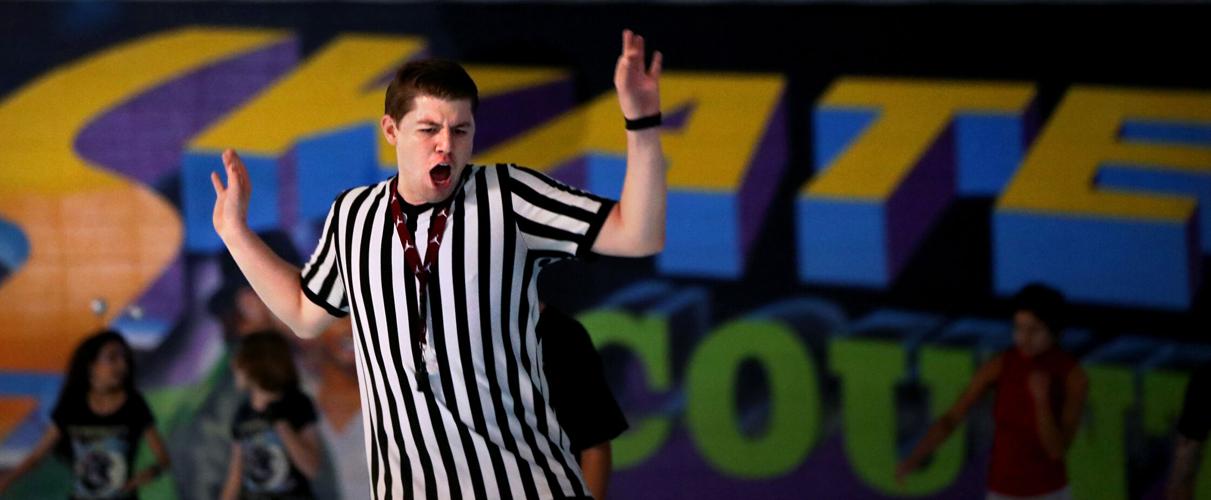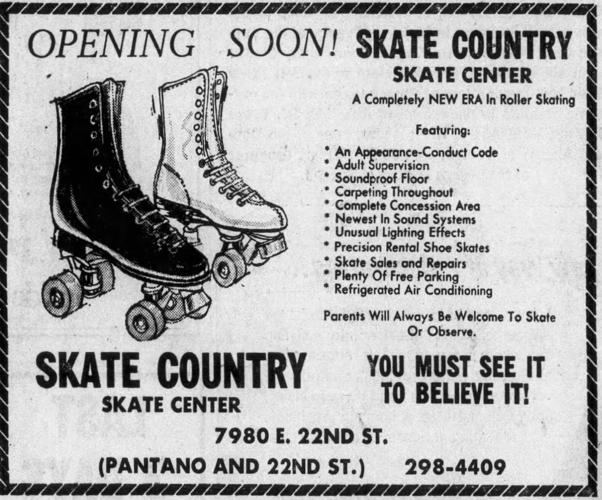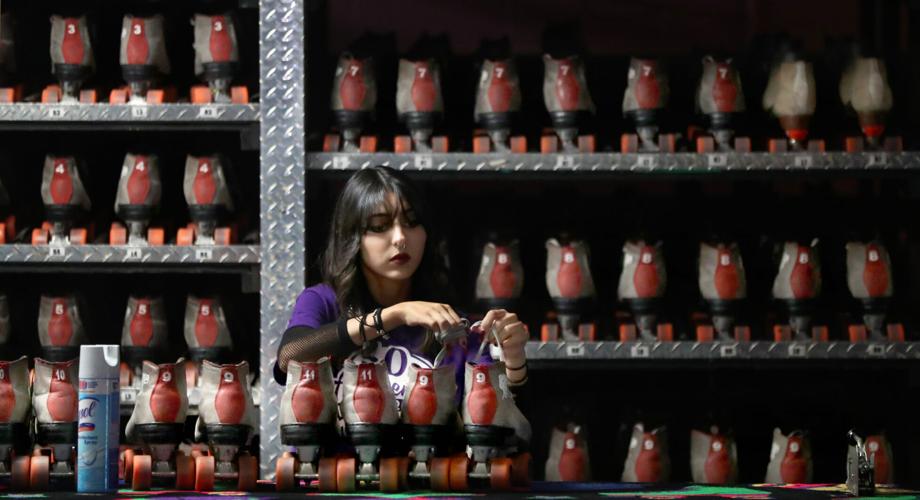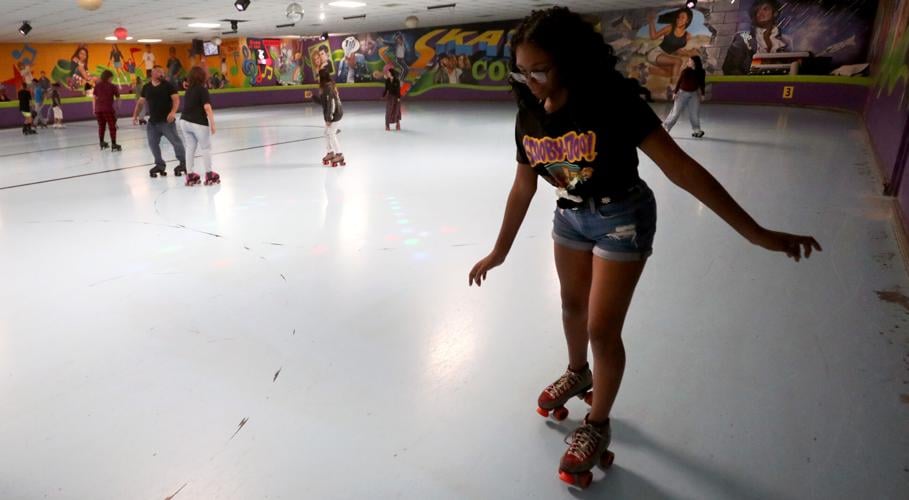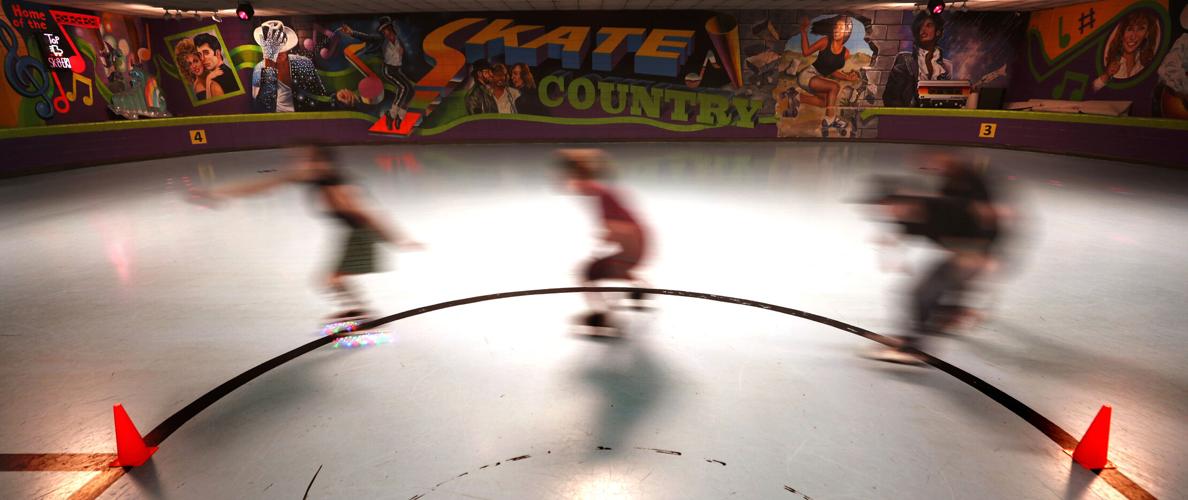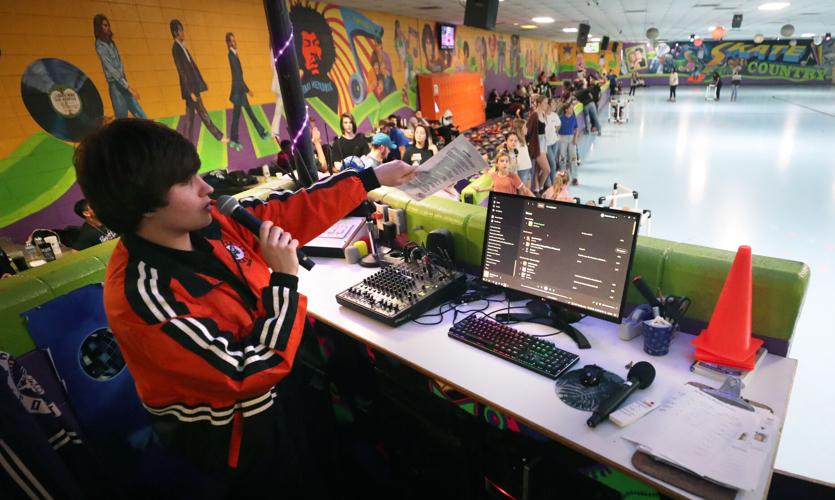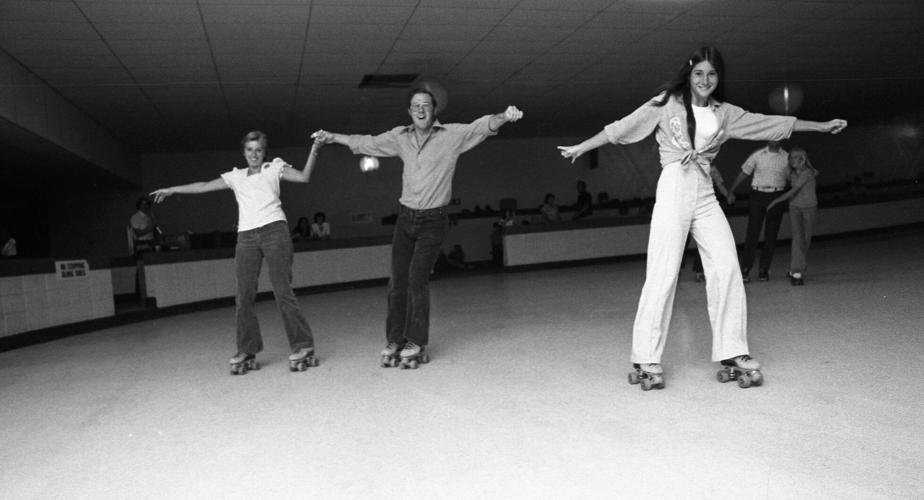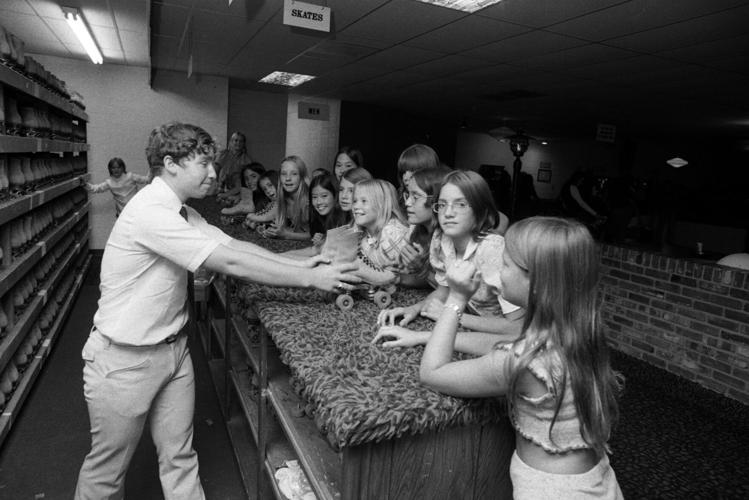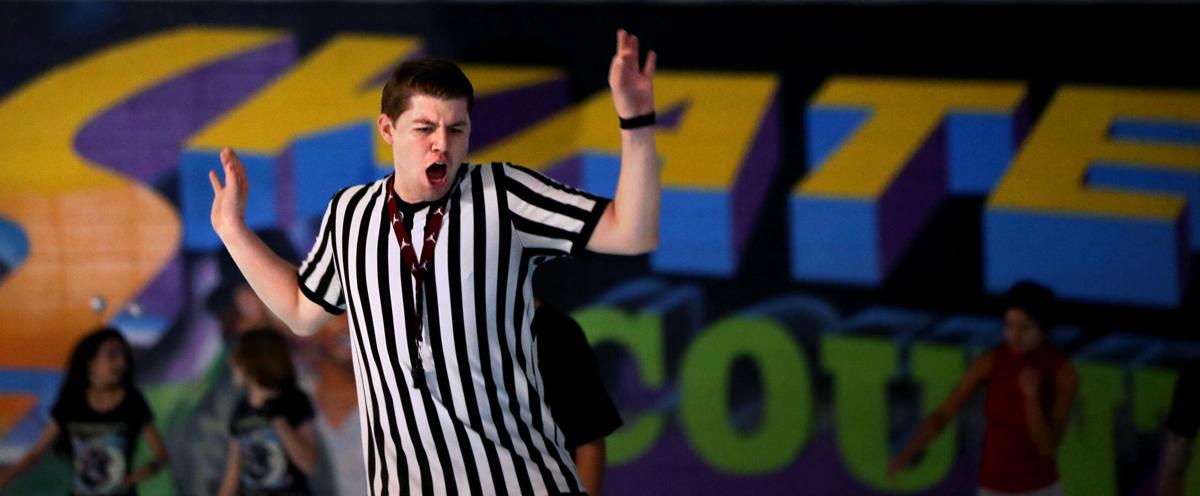It was the early ‘90s when Marlene Leer, just a teen at the time, was sitting in Skate Country on a day the rink was temporarily closed for some contracting work.
“Future owner Marlene Leer,” she wrote in the dust on one of the tables.
Leer was a regular at the east-side roller rink for years before she started working there at age 14.
Now, 27 years later, her dusty wish has come true. She's Skate Country's owner.
This year, Skate Country turns 50 years old. Through the last half century, the business has braved recessions, a pandemic and decades of changes. But more than that, the rink has strengthened families, built friendships and created countless memories for generations of Tucsonans.

Eager skaters crowd around the skate counter at Skate Country East, 7980 E. 22nd St., Tucson, in 1973.
Tucson's sole roller rink
It all started in Iowa.
Five founders, including Donald Laughlin and Richard Nemmers, started three skating centers in the Midwest. They never liked the term “rink,” says Skate Country’s former owner Robert Snellstrom.
The success of the three centers in Iowa led the founders to open their fourth location, this one in 1972 in Tucson — the same rink that still sits at 7980 E. 22nd St. today.

A 1972 newspaper announcing the opening of Skate Country in Tucson.
“I joined Skate Country as a part-time employee while I was paying for school, going to the U of A in 1973,” Snellstrom says. “And then in 1976, they decided to open two facilities in New Orleans and asked me to go run one as a general manager.”
Though his parents weren’t happy about it, Snellstrom left Tucson for Louisiana. Skate Country would eventually open a center in Florida, and then a second Tucson location in the ‘80s — first on Oracle Road, which then moved to Stone Avenue and closed in the early 2000s.
Eventually, though, the owners were ready to retire.
“They asked me if I wanted to purchase the 22nd Street location because they were getting older and they knew they would have to sell their facilities so they tried to sell them to people who had been working there for many years so they’d have the opportunity to buy them,” Snellstrom says.

The DJ blows the whistle and calls foul (maybe on his own pants) while spinning 45s at Skate Country East, 7980 E. 22nd St., Tucson, in 1973.
Snellstrom purchased the business in the early ‘90s — which is also around the time when Leer became a part-time employee, working alongside Snellstrom for two decades.
“When I decided to retire, I knew she was capable and offered the business to her,” Snellstrom says, calling the process hard-earned for Leer, who was going to nursing school at the time of the proposal.
“It was actually a dream come true. I’ve always wanted to own my own rink,” she says. “It doesn’t feel like work at all.”
A few Skate Countrys still exist in other states today, but they’re each independently owned and operated. The 22nd Street location is Tucson's sole roller rink.

Gaby Perez readies a batch of returned skates at Skate Country, 7980 E. 22nd St.
Maintaining the nostalgia
When walking into Skate Country, it looks as though it did in the 2000s — in the best way possible. That dose of nostalgia you feel when skating along the neon carpets, staring at the mural-clad walls, is intentional.
“We like to keep the nostalgic feel. We have the same games — Four Corners, races, limbo, the Hokey Pokey,” Leer says. She doesn't want to change anything that will make people miss what they love about Skate Country — “so people don’t lose the memory of having a good time.”

DJ Alec Johnson reads the rules to the crowd lined up and waiting to get out on the floor during an afternoon session at Skate Country, 7980 E. 22nd St.
Not everything has stayed the same, though. Over the years, they’ve gotten a new sound system, installed a new roof and new carpets, made upgrades to the bathrooms. They’ve gotten smart lockers, and painted fresh murals sporting musicians from the decades — from Elvis Presley to Justin Bieber.
“We try to improve, yet keep it nostalgic,” Leer says.

Ava Welcher tries her hand at skating backwards during the reverse skate at Skate Country, 7980 E. 22nd St.
Leer attends national conventions once or twice a year, which helps her stay up to date on industry trends. One of Skate Country's biggest evolutions is reflected in what used to be the game room.
As certain games started to go out of style, Skate Country’s arcade was replaced with a skate shop. At most roller rinks, you can order skates and wait a few weeks to pick them up. But that’s not how it is at Skate Country — “We changed that to having an inventory just like a shoe store so people don’t have to wait. They can just come in and buy the skate,” Snellstrom says.
The skate shop is an addition that has been well-received by customers and industry-wide.

Acting up for the camera at Skate Country North, Tucson, in 1975.
Despite multiple economic downfalls in the country over the last 50 years, Leer and Snellstrom both agree — Skate Country is pretty much recession-proof.
“In the recession of the early 1980s, skating did really well, and is doing well again. It’s known as a recession-proof business because it’s affordable,” Snellstrom says. Depending on the day, admission is $4-$10. Skate rental is $5.
The COVID-19 pandemic has been another beast, forcing the business to close down for months (though skating in general has actually made quite the comeback in recent years).
“That was really hard on us,” Leer says. “We survived, luckily, and now we’re doing better than ever.”

Five-year-old Cleo Knipe is dressed for her day out on the floor at Skate Country, 7980 E. 22nd St.
Generations of skaters
When Skate Country says they’re a family business, they mean it.
Employees who are parents are encouraged to bring their children to work, allowing them to save money on day care. And as it so happens, the kids who grow up at Skate Country often want to work there when they hit 16 years old.
“It’s a friendly vicious cycle,” Snellstrom says. Many of the people Leer worked with in the ‘90s now have kids of their own who are Skate Country employees.
“I brought my own son to work and now he’s a manager for me,” Leer says. “He grew up in the office — five days old and he’s still there at 21,” Snellstrom added.
It’s like one big skate family, Leer says. Some frequent skaters have been visiting the rink since the ‘70s — now bringing their grandkids with them.

Competitors head into the final turn of the speed skating races at Skate Country, 7980 E. 22nd St.
“Over the years, I’ve seen a lot of kids that come in there — they don’t fit in at school or they don’t have a lot of friends, but then they start skating and that whole thing starts changing,” Snellstrom says. “They get friends, they gain confidence. It’s like a second home for them.”
Both Snellstrom and Leer just like seeing people happy.
“There are so many business that are necessary but they don’t have happy customers. Fry’s and Safeway have happy customers, but you don’t go there to be happy,” Snellstrom says.
“Just last Thursday, I was skating and noticed everyone was happy and dancing — and it’s so rewarding to see everyone happy,” Leer says. “I’m honored and humbled to be in this position.”
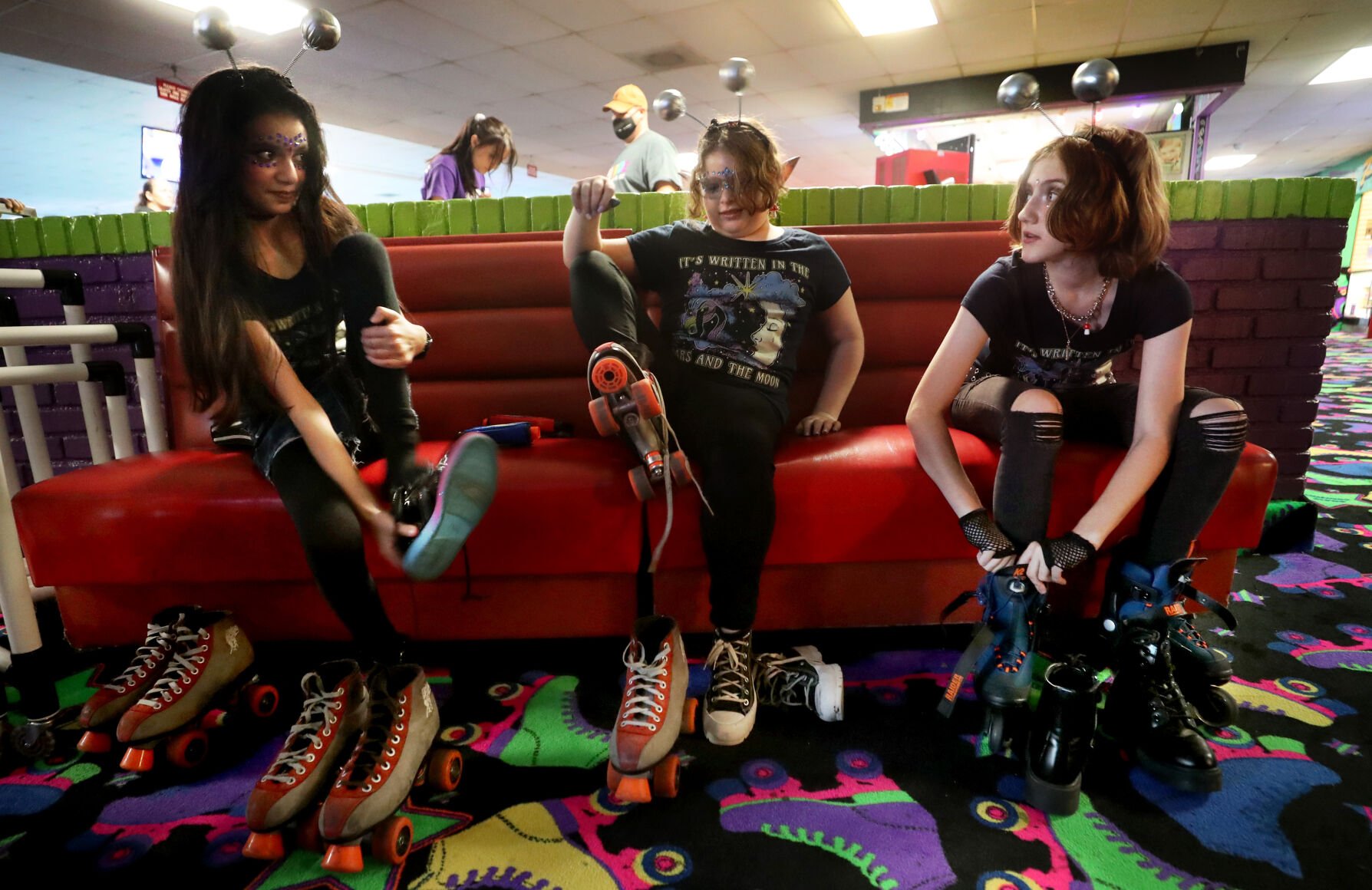
Birthday girl Gabriella Medina-Alejandres, left, Abigail Ruelaz and Maddy Hummer get booted up for the party at Skate Country, 7980 E. 22nd St.
Skate Country
Location: 7980 E. 22nd St., near South Pantano Parkway.
Hours: 3-8 p.m. Mondays and Wednesdays. 3-10 p.m. Tuesdays, Thursdays and Fridays. 10 a.m. to 10 p.m. Saturdays. 1-9 p.m. Sundays. Adult Night is 8-10 p.m. every Tuesday and Thursday. Tiny Tot Skate is 10 a.m. to noon Saturdays. Hours are subject to change. Check Skate Country's event calendar for details.
Cost: $4-$10 for admission depending on the day, $5 for skate rental. If you visit 6-9 p.m. Sundays, a group of six can get in for $12.
Visit Skate Country's website for more information.
Photos: Skate County in Tucson celebrates 50 years of roller skating

Acting up for the camera at Skate Country North, Tucson, in 1975.

All the girls crowd around the guy at the roller skate counter at Skate Country East, 7980 E 22nd St., Tucson, in 1973.

A couple skating at Skate Country East, 7980 E 22nd St., Tucson, in 1973.

A 1972 newspaper announcing the opening of Skate Country in Tucson.

Girls crowd the benches to lace up their roller skates at Skate Country East, 7980 E 22nd St., Tucson, in 1973.

Waiting for that special someone at Skate Country East, 7980 E 22nd St., Tucson, in 1973.

Hanging out and eating was part of the fun at Skate Country East, 7980 E 22nd St., Tucson, in 1973.

The DJ blows the whistle and calls foul (maybe on his own pants) while spinning 45s at Skate Country East, 7980 E. 22nd St., Tucson, in 1973.

Mary Jo Campbell, left, helps Kandy Campbell, 4, with her skates at Skate Country North, Tucson, in 1975.

Johny Campbell, 7, has the hair ready for a spin around the rink at Skate Country North, Tucson, in 1975

A group tries to skate in unison at Skate Country North, Tucson, in 1975.

Cameron Corey, 8, gets ready to take the floor at Skate Country North, Tucson, in 1975.

A group on the floor at Skate Country North, Tucson, in 1975.

Vicki Poorman, Robin Benson and Bonnie Fitzgerald lace up at Skate Country North, Tucson, in 1975.

Dress for success: An employee repairs skates at Skate Country North, Tucson, in 1975

Going airborne during disco night at Skate Country North, 4646 N. Oracle Road, Tucson, in August, 1978.

Let's not do that again: Wednesday Night Fever at Skate Country North, 4646 N. Oracle Road, Tucson, in August, 1978.

Disco night at Skate Country North, 4646 N. Oracle Road, Tucson, in August, 1978.

Slow dancing while everyone else watches at disco night at Skate Country North, 4646 N. Oracle Road, Tucson, in August, 1978.

DJs take their disco music seriously during Wednesday Night Fever at Skate Country North, 4646 N. Oracle Road, Tucson, in August, 1978.

Showing off during disco night at Skate Country North, 4646 N. Oracle Road, Tucson, in August, 1978.

Wednesday Night Fever (disco night) at Skate Country North, 4646 N. Oracle Road, Tucson, in August, 1978.

Disco night at Skate Country North, 4646 N. Oracle Road, Tucson, in August, 1978.

The Noon session of open skating at Skate Country East, 7980 E. 22nd St, Tucson, in August, 1981.

The Noon session of open skating at Skate Country East, 7980 E. 22nd St, Tucson, in August, 1981.

The Noon session of open skating at Skate Country East, 7980 E. 22nd St, Tucson, in August, 1981.

Canyon View Elementary School students enjoy a skate party at Skate Country during the 1987-88 school year, which was the school's first year in existence.

Adult Night open skating at Skate Country North, 2700 N. Stone Ave., Tucson, in March, 1994.

Adult Night open skating at Skate Country North, 2700 N. Stone Ave., Tucson, in March, 1994.

Del Soucier keeps an eye on roller skaters while spinning tunes at Adult Night open skating at Skate Country North, 2700 N. Stone Ave., Tucson, in March, 1994.

Keith Long, Jerry Bowman and Steve Williams at Adult Night open skating at Skate Country North, 2700 N. Stone Ave., Tucson, in March, 1994.

Adult Night open skating at Skate Country North, 2700 N. Stone Ave., Tucson, in March, 1994.

Todd Autenreith helps his son Scotty, 3, learn to skate at Skate Country in 1998.

Gabriel Osollo, 12, plays foosball against Ryan Heiser, 10, at Skate Country. In 1996.

Marke Aguilar, 7, falls near a mural at Skate Country North at 2700 N. Stone Ave in 1998. During the Summer hours, about 175 kids skate each day.

teven Williams and his sister Shelby Williams skate around the roller rink at Skate Country East on Nov. 15, 2007.

Cecilia Leyva, 13, skates around the rink during the Humane Society Stake-A-Thon at Skate Country on April 4, 2009.

Marlene Leer, right, cleans skates as Kevin Armstrong, left, helps daughter Olivia put on her skates at Skate Country, 7980 E. 22nd St., on Nov. 20, 2011.

Owner Bob Snellstrom watches activity on the rink at Skate Country, 7980 E. 22nd St., on Nov. 20, 2011.

Lance Ryberg skates with his daughters on the big rink during his daughter's birthday party at Skate Country, 7980 E. 22nd St., on Nov. 20, 2011.

Lance Ryberg, right, and party goers eat pizza during his daughter's birthday party at Skate Country, 7980 E. 22nd St., on Nov. 20, 2011.

Roxie Elliott works on a crossword puzzle while her boyfriend skates during adult skate night at Skate Country East, 7980 E. 22nd St. on Sept. 28, 2007. Elliott said she "used to skate years ago" but has since stopped as she's gotten older, but her boyfriend has been trying to get her to skate with him.

Camp Director Scott Zorn lends a hand to Sydnie Grabell, 8, at Skate Country, 7980 E 22nd St. in Tucson. Zorn led a field trip group from the Tucson Jewish Community Center's Winter Wonder Days and Spectacular Sports camps.

Skaters whip by as a youngster waits for the contest being played to end and the resumption of open skating to retake the floor at Skate Country East, Tucson, AZ., Saturday, May 27, 2006.

Roller skates await to be used at the event "Skaters gonna skate" on March 21, 2014 at Skate Country in Tucson.

Rose Waterman (left) and Stephanie Pederson (right) take off their skates early on Saturday, March 22, 2014 at Skate Country.

From right: Gigi Swiney, Rebecca Ripley, Suzi Berrie, Elizabeth Slick and Taylor Duran skate in a chain early on March 22, 2014 at Skate Country. They are all members of the roller derby team called "Renegade Roller Girls of Tucson."

Floor guard Nick Hayes dances to the music as he monitors the skaters and keeps the traffic flowing at Skate Country, 7980 E. 22nd St.

Rental skates get restocked between sessions during an afternoon at Skate Country, 7980 E 22nd St., Tucson.

Five-year-old Cleo Knipe is dressed for her day out on the floor at Skate Country, 7980 E. 22nd St.

Candice Pocase and her skates light up the floor at Skate Country, 7980 E. 22nd St.

Birthday girl Gabriella Medina-Alejandres, left, Abigail Ruelaz and Maddy Hummer get booted up for the party at Skate Country, 7980 E. 22nd St.

Gaby Perez readies a batch of returned skates at Skate Country, 7980 E. 22nd St.

Ava Welcher tries her hand at skating backwards during the reverse skate at Skate Country, 7980 E. 22nd St.

Competitors head into the final turn of the speed skating races at Skate Country, 7980 E. 22nd St.

DJ Alec Johnson reads the rules to the crowd lined up and waiting to get out on the floor during an afternoon session at Skate Country, 7980 E. 22nd St.

Ashaun Papworth gets video of herself and friends dancing to the Cupid Shuffle, part of the dances to end a session at Skate Country, 7980 E 22nd St.


